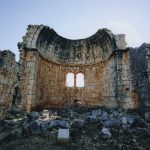Where is the wise man? Where is the scribe? Where is the debater of this age? Has not God made foolish the wisdom of the world? For since in the wisdom of God the world through its wisdom did not come to know God, God was well-pleased through the foolishness of the message preached to save those who believe. For indeed Jews ask for signs and Greeks search for wisdom; but we preach Christ crucified, to Jews a stumbling block and to Gentiles foolishness, but to those who are the called, both Jews and Greeks, Christ the power of God and the wisdom of God. Because the foolishness [moeros – silly, stupid, foolish] of God is wiser than men, and the weakness of God is stronger than men. (1 Corinthians 1:20-25)
In the above passage, Paul tries to get the Corinthians to understand that the avenue to comprehending the highest priorities of God does not take one through the wisdom of the world. In fact, he says that salvation has been removed from the plane of man’s ability to think on his own and instead established on the foundation of faith in something or someone outside himself (verse 21). In verse 22, “but we preach Christ crucified,” that it was His life crucified as an offering that should be the object of that faith. The emphasis is on plan of the Father executed by the Son on behalf of those, both Jews and Greeks, who would place their confidence in the fulfillment of that plan by a crucified Christ. Man’s ability or efforts are not part of the equation. In fact, “God has chosen the foolish things of the world to shame the wise (verse 27).
Blow the Trumpets
Now Jericho was tightly shut because of the sons of Israel; no one went out and no one came in. The Lord said to Joshua, “See, I have given Jericho into your hand, with its king and the valiant warriors. “You shall march around the city, all the men of war circling the city once. You shall do so for six days. “Also seven priests shall carry seven trumpets of rams’ horns before the ark; then on the seventh day you shall march around the city seven times, and the priests shall blow the trumpets. “It shall be that when they make a long blast with the ram’s horn, and when you hear the sound of the trumpet, all the people shall shout with a great shout; and the wall of the city will fall down flat, and the people will go up every man straight ahead.” (Joshua 6:1-5)
It was the Lord’s intention that the Jews would begin to take control and possess their promised land city by city, beginning with Jericho. In taking Jericho, God’s plan was to demonstrate how much the people needed to trust in God’s plan, no matter how foolish it might seem. As the above passage states, God gives specific instructions to march around the walls of the city each day for six days, with seven priests carrying seven trumpets. On the seventh day, the people would march around the city seven times, then the priests would blow the trumpets and the walls would fall down flat. I’m sure this plan was not related to any known military strategies for winning any military battle; this plan was teaching a willingness to completely trust in God, no matter how foolish it may seem.
Outnumbered
There are similar events in Scripture where God commanded the Jews facing an adversarial enemy to do something contrary to wise military counsel. This is the basis of real faith, trusting God when it appears there can be no victory in any situation, no matter how grave it may be. Another example is found in 2 Chronicles 20 where the Jews were facing the armies of Ammon, Moab, and Mount Seir. In verse 20, King Jehoshaphat says, “Listen to me, O Judah and inhabitants of Jerusalem, put your trust in the Lord your God and you will be established. Put your trust in His prophets and succeed.” The Lord’s commandment was for the king to choose singers who would go before the army to sing praises to God in holy attire and give thanks for the upcoming victory. Foolishness to man, yet it was God’s perfect plan. Verses 22-23 says that “When they began singing and praising, the Lord set ambushes against the sons of Ammon, Moab and Mount Seir, who had come against Judah; so they were routed. For the sons of Ammon and Moab rose up against the inhabitants of Mount Seir destroying them completely; and when they had finished with the inhabitants of Seir, they helped to destroy one another.” Their enemies destroyed each other without any military effort from the army.
Then Jerubbaal (that is, Gideon) and all the people who were with him, rose early and camped beside the spring of Harod; and the camp of Midian was on the north side of them by the hill of Moreh in the valley. The Lord said to Gideon, “The people who are with you are too many for Me to give Midian into their hands, for Israel would become boastful, saying, ‘My own power has delivered me.’ “Now therefore come, proclaim in the hearing of the people, saying, ‘Whoever is afraid and trembling, let him return and depart from Mount Gilead.'” So, 22,000 people returned, but 10,000 remained. Then the Lord said to Gideon, “The people are still too many; bring them down to the water and I will test them for you there. Therefore, it shall be that he of whom I say to you, ‘This one shall go with you,’ he shall go with you; but everyone of whom I say to you, ‘This one shall not go with you,’ he shall not go.” So, he brought the people down to the water. And the Lord said to Gideon, “You shall separate everyone who laps the water with his tongue as a dog laps, as well as everyone who kneels to drink.” Now the number of those who lapped, putting their hand to their mouth, was 300 men; but all the rest of the people kneeled to drink water. The Lord said to Gideon, “I will deliver you with the 300 men who lapped and will give the Midianites into your hands; so, let all the other people go, each man to his home.” So, the 300 men took the people’s provisions and their trumpets into their hands. And Gideon sent all the other men of Israel, each to his tent, but retained the 300 men; and the camp of Midian was below him in the valley. (Judges 7:1-8)
Gideon’s 300 Men
Another example is found in the account of Gideon above. The Lord explains that His purpose is to keep the people from becoming boastful, thus taking credit for the victory that will only be attributable to God. God told Gideon that the 32,000 troops assembled to fight the Midianite army were too many, even though greatly outnumbered. As a result, 22,000 people returned, leaving 10,000 to fight. As it turns out, even 10,000 was too many for the Lord, so He devises a test to determine which of the remaining would be worthy of this fight. In verse 5, “You shall separate everyone who laps the water with his tongue as a dog laps, as well as everyone who kneels to drink.” Only 300 men qualified while the rest kneeled to drink. It appears that only those who were watchful would be useful.
God instructed Gideon to break the men into three groups of 100 each and would carry trumpets and empty jars with torches inside as their weapons while the Lord would fulfill His promise to “give the Midianites into your hands.” The three groups would be night watchmen, each group taking a different shift and were told, When the three companies blew the trumpets and broke the pitchers, they held the torches in their left hands and the trumpets in their right hands for blowing, and cried, “A sword for the Lord and for Gideon!” (verse 20). This commotion demonstrated their trust in the Lord while creating confusion within the Midianite army and they fled.
A Contemporary Illustration
Here’s a story from Israel’s not-so-distant past. In spring 2003, Israel was fighting a war against terrorism. The Israel Defense Forces (IDF) were fairly successful, but a few battles were hard to win. One such fight took place in Jenin, a Palestinian stronghold. The Israeli fighters described an incident where the morale was very low. Many soldiers had already lost their lives, and as a last resort, an Israeli general had threatened over the loudspeaker to send in F-16 fighter jets. It was an empty threat that neither the soldiers nor the terrorists took seriously.
That is until a loud booming sound was heard moments later. At first, the soldiers were confused, but then they realized the sound was thunder, even though it was spring and in Israel, it almost never rains in the spring. The terrorists were not as wise. They immediately surrendered. When asked why, they said, “We heard the sound of fighter jets and knew we were defeated.” God’s thunder won the battle. A modern-day miracle!
Ultimately, the Lord is always teaching His people to “Trust in the Lord with all your heart and do not lean on your own understanding. In all your ways acknowledge Him, and He will make your paths straight” (Proverbs 3:5-6). It is about learning how to trust in the promises of God, no matter what.













